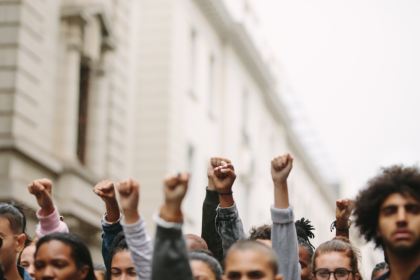A tense battle over who gets to be an American played out in the marble halls of the Supreme Court on Thursday, where the justices appeared deeply divided over President Trump’s controversial order to end birthright citizenship. But the case isn’t just about citizenship—it’s about how much power judges should have to stop presidential actions nationwide, setting up a showdown that could dramatically reshape the balance of power in American government.
The backdoor power grab
In a strategic move that has legal experts raising eyebrows, the Trump administration isn’t asking the Supreme Court to focus directly on whether the president can strip citizenship rights from babies born to undocumented or temporary visa holders. Instead, they’re targeting something that sounds far more technical but could have massive implications—the power of federal judges to issue “nationwide injunctions” that block presidential policies across the entire country.
This approach represents a clever two-step maneuver. If the administration wins on the injunction question, Trump’s order could immediately take effect in states where judges haven’t blocked it, creating a bizarre patchwork where a baby’s citizenship would depend entirely on which state they happened to be born in.
Even more significantly, limiting nationwide injunctions would dramatically weaken one of the few tools that can quickly stop presidential overreach, potentially giving this and future presidents far more latitude to implement controversial policies before the courts can fully review them.
The constitutional showdown
While the administration wants to focus on injunctions, the explosive citizenship question still loomed large during arguments. Trump’s January order declared that children born on American soil would no longer automatically receive citizenship if their parents were undocumented or on temporary visas like student or work permits—upending 125 years of constitutional understanding.
At the heart of the dispute is the 14th Amendment’s citizenship clause, which states that “all persons born or naturalized in the United States, and subject to the jurisdiction thereof, are citizens.” Since an 1898 Supreme Court ruling in United States v. Wong Kim Ark, this language has been understood to grant citizenship to virtually everyone born on American soil, regardless of their parents’ status.
The Trump administration argues this longstanding interpretation is wrong, claiming the amendment was only intended to grant citizenship to newly freed Black people after the Civil War—not to children of immigrants lacking permanent legal status. This argument directly challenges multiple Supreme Court precedents spanning more than a century.
The ideological divide
The justices’ questions revealed a court seemingly split along familiar ideological lines. Liberal Justice Sonia Sotomayor raised concerns about creating “a class of stateless people” if birthright citizenship were eliminated in some states but not others while cases worked through the courts. She also pointedly noted that the Supreme Court has upheld birthright citizenship four times, starting with the Wong Kim Ark case in 1898.
Conservative Justice Clarence Thomas, meanwhile, appeared most receptive to the administration’s arguments against nationwide injunctions, noting that such orders only became common in the 1960s and suggesting the country functioned fine without them. Justice Samuel Alito took aim at district court judges who he said suffer from “an occupational disease” of thinking “I am right and I can do whatever I want.”
The court’s newest members and Chief Justice John Roberts asked questions of both sides without clearly revealing their positions, leaving court watchers to speculate about where the 6-3 conservative-majority court might ultimately land.
The practical chaos
Several justices, including conservative Neil Gorsuch, raised practical concerns about eliminating nationwide injunctions. Gorsuch noted it would create a “patchwork” of different rules and highlighted how long it takes to assemble class action lawsuits as an alternative.
Liberal Justice Elena Kagan went further, suggesting the alternative to nationwide injunctions would be a “chaotic system” where individuals would need to file their own separate lawsuits challenging the same policy over and over across the country.
New Jersey Solicitor General Jeremy Feigenbaum, representing states challenging Trump’s order, vividly described how citizenship would be “turned on and off depending on state lines” if nationwide injunctions were prohibited. “Since the 14th Amendment, our country has never allowed American citizenship to vary based on the state in which someone resides,” he argued, noting that hospitals and state agencies would face enormous implementation challenges.
The human impact
Beyond the legal abstractions lies a stark human reality. According to research by the Migration Policy Institute, eliminating birthright citizenship would mean approximately 255,000 babies born each year would no longer receive U.S. citizenship—despite being born on American soil.
These children could potentially face a lifetime of legal complications, possibly even becoming stateless if their parents’ home countries don’t grant citizenship to children born abroad. This would create an expanding population of people born and raised in America but permanently excluded from full participation in American life.
The implications extend beyond the children themselves to hospitals, schools, and government agencies that would suddenly need to implement different documentation systems for births across state lines. Social service providers would face the challenge of serving communities with mixed citizenship status among siblings depending on when and where they were born.
The executive power expansion
During arguments, U.S. Solicitor General D. John Sauer emphasized that since Trump took office in January, lower courts have issued 40 nationwide injunctions against administration policies. He argued these injunctions exceed judicial authority under the Constitution, which he claimed “exists only to address the injury to the complaining party” rather than providing broader relief.
This position reveals the case’s significance beyond birthright citizenship. A ruling limiting nationwide injunctions would fundamentally alter how presidential power is checked in the American system, potentially allowing controversial policies to take immediate effect in parts of the country even when judges find them likely unconstitutional.
This shift would be particularly consequential given the increasing polarization of the federal judiciary, where judges appointed by different presidents often reach dramatically different conclusions about the same policies. Without nationwide injunctions, presidential actions might remain in effect in some states for years while legal challenges work their way through the courts.
The constitutional contours
While the administration presented its arguments against nationwide injunctions in technical legal terms, Kelsi Corkran, representing immigrant rights groups, directly challenged their premise. She argued that “preliminary injunctions may benefit non-parties when necessary to provide complete relief to the plaintiffs or when warranted by extraordinary circumstances, both of which are true here.”
In other words, some cases—like those involving citizenship—are so fundamental that they cannot be addressed piecemeal. A person is either a citizen or not; there’s no middle ground that would make sense in a state-by-state approach.
Corkran didn’t mince words about the underlying citizenship question either, calling Trump’s order “blatantly unlawful” based on longstanding precedent. This directness highlighted the unusual nature of the case, where the court is being asked to focus on procedural questions while potentially allowing a “blatantly unlawful” order to take partial effect.
The nationwide stakes
The cases before the justices originated from three different parts of the country. In Maryland, immigrant rights groups and several pregnant non-citizen women filed suit. In Washington state, four states—Washington, Arizona, Illinois, and Oregon—challenged the order. And the Massachusetts case was brought by a coalition of 18 Democratic state attorneys general from across the country.
This geographic diversity underscores the nationwide concern about both the citizenship question and the broader issue of judicial power. States with both Republican and Democratic leadership have expressed alarm about the practical implementation challenges that would come with varying citizenship rules across state lines.
The nationwide implications extend beyond the specific policy at issue. A ruling limiting injunctions would affect every future challenge to presidential actions, potentially allowing controversial policies on immigration, healthcare, environmental protection, and other areas to take immediate effect despite serious legal questions about their validity.
The uncertain timeline
As the justices deliberate, hundreds of thousands of pregnant women and their families face uncertainty about the citizenship status of their soon-to-be-born children. The court typically issues its most significant decisions in late June, meaning a ruling likely remains months away.
In the meantime, lower court injunctions remain in place, preserving birthright citizenship nationwide for now. But the administration’s focus on the injunction issue creates the possibility of a ruling that doesn’t directly address the constitutional question while still allowing the policy to take partial effect.
This partial implementation would create unprecedented confusion around one of the most fundamental aspects of American identity—who qualifies as a citizen from birth. It would also set the stage for years of additional litigation as cases challenging the order work their way back up to the Supreme Court for a definitive ruling on the constitutional question.
Whether decided on narrow procedural grounds or through a broad constitutional ruling, the case represents a pivotal moment in America’s ongoing struggle to define its national identity and the limits of presidential power. The justices’ decision will echo far beyond the legal world, potentially changing what it means to be American for generations to come.


















